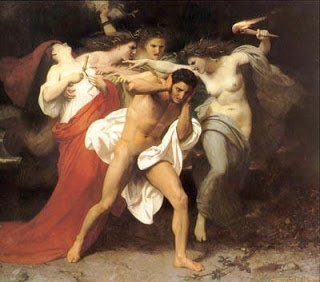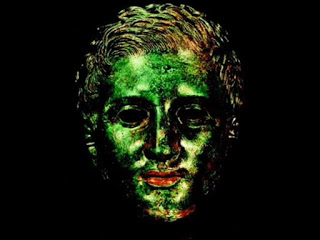(1)
The names of the planets of the solar
system were taken from Greek and Roman Mythology.
The names of the planets of the solar
system were taken from Greek and Roman Mythology.
(2)
That brings me back to my theme, my
question of why study ancient Greek and Roman history?
That brings me back to my theme, my
question of why study ancient Greek and Roman history?
(3)
When I was a High School freshman, I
took an elective course in ancient history. I have been interested ever since,
up to a point, in the study of ancient Greece and Rome.
When I was a High School freshman, I
took an elective course in ancient history. I have been interested ever since,
up to a point, in the study of ancient Greece and Rome.
(4)
I remember when I gave my somewhat
verbose report on the novel The Dictator. I got the impression that some of you
listeners were wondering why on earth I was going on and on about the status of
Julius Caesar – was he an emperor or a dictator? And also about the final,
gruesome assassination of Cato.
I remember when I gave my somewhat
verbose report on the novel The Dictator. I got the impression that some of you
listeners were wondering why on earth I was going on and on about the status of
Julius Caesar – was he an emperor or a dictator? And also about the final,
gruesome assassination of Cato.
(5)
The answer is because, in the ancient
world of Greece and Rome, gay and Lesbian people had a completely different
status from that we had in the 19th Century in the British Empire
under Queen Victoria who persecuted us mindlessly and irrationally.
The answer is because, in the ancient
world of Greece and Rome, gay and Lesbian people had a completely different
status from that we had in the 19th Century in the British Empire
under Queen Victoria who persecuted us mindlessly and irrationally.
(6)
It took me a while to understand what
certain gay classical history scholars were trying to tell me, but, thanks
mainly to Alexander the Great, gay men had control of the ancient Greek
military establishment.
It took me a while to understand what
certain gay classical history scholars were trying to tell me, but, thanks
mainly to Alexander the Great, gay men had control of the ancient Greek
military establishment.
(7)
Straight heterosexual men, the
“breeders” were expected to stay home and bring up the children. The freer
uncommitted population of gay men were expected to become the nation’s warriors,
which they did.
Straight heterosexual men, the
“breeders” were expected to stay home and bring up the children. The freer
uncommitted population of gay men were expected to become the nation’s warriors,
which they did.
(8)
In other words, for gay men and
Lesbians, ancient Greek and ancient Roman society constituted our golden age.
An army of gay lovers was invincible, didn’t Alexander the Great prove that?
In other words, for gay men and
Lesbians, ancient Greek and ancient Roman society constituted our golden age.
An army of gay lovers was invincible, didn’t Alexander the Great prove that?
Roman historiography is indebted to the Greeks, who invented the form. The Romans had great models to
base their works upon, such as Herodotus (c. 484 – 425 BCE) and Thucydides (c. 460 – c. 395 BCE). Roman historiographical forms are different from the Greek
ones however, and voice very Roman concerns. Unlike the Greeks, Roman
historiography did not start out with an oral historical tradition. The Roman
style of history was based on the way that the Annals of the Pontifex Maximus, or the Annales Maximi, were recorded. The Annales Maximi include a wide array
of information, including religious documents, names of consuls, deaths of
priests, and various disasters throughout history. Also part of the Annales
Maximi are the White Tablets, or the “Tabulae Albatae,” which consist of
information on the origin of the republic.
base their works upon, such as Herodotus (c. 484 – 425 BCE) and Thucydides (c. 460 – c. 395 BCE). Roman historiographical forms are different from the Greek
ones however, and voice very Roman concerns. Unlike the Greeks, Roman
historiography did not start out with an oral historical tradition. The Roman
style of history was based on the way that the Annals of the Pontifex Maximus, or the Annales Maximi, were recorded. The Annales Maximi include a wide array
of information, including religious documents, names of consuls, deaths of
priests, and various disasters throughout history. Also part of the Annales
Maximi are the White Tablets, or the “Tabulae Albatae,” which consist of
information on the origin of the republic.
(10)
In other words, the Roman historians
improved over the Greeks, because the Romans attempted to base their historical
reporting on written records rather than on traditional folklore. It was
somewhat more scientific.
In other words, the Roman historians
improved over the Greeks, because the Romans attempted to base their historical
reporting on written records rather than on traditional folklore. It was
somewhat more scientific.
(11)
“Pontifex maximus” was the religious title
of the emperor, the Imperator. Of course, his annals of events were of course
biased to extol and emphasize his own glory. It means the greatest bridge
builder. Recently certain democrats and the Pope criticized Donald Trump for
promoting the idea of building a wall. They said the President should be a
bridge builder not a wall builder. That reminded me of the Pontifex maximus.
“Pontifex maximus” was the religious title
of the emperor, the Imperator. Of course, his annals of events were of course
biased to extol and emphasize his own glory. It means the greatest bridge
builder. Recently certain democrats and the Pope criticized Donald Trump for
promoting the idea of building a wall. They said the President should be a
bridge builder not a wall builder. That reminded me of the Pontifex maximus.
(12)
In trying to study ancient Greek and Roman
history, however, the novice notices that they contradict each other, so that a
clear statement of actually what happened way back when was often impossible.
In trying to study ancient Greek and Roman
history, however, the novice notices that they contradict each other, so that a
clear statement of actually what happened way back when was often impossible.
(13)
In other words, before studying classical
history, it would be better first to study how to study ancient classical
history – i.e. “historiography”.
In other words, before studying classical
history, it would be better first to study how to study ancient classical
history – i.e. “historiography”.
(14)
To limit ourselves to ancient Greek and
Roman mythology, Mercury (planet nearest to the sun), in Greek was Hermes the
winged messenger.
To limit ourselves to ancient Greek and
Roman mythology, Mercury (planet nearest to the sun), in Greek was Hermes the
winged messenger.
(15)
Venus (a very hot planet) was Aphrodite,
the Goddess of Beauty.
Venus (a very hot planet) was Aphrodite,
the Goddess of Beauty.
(16)
Earth was Roman Terra, ancient Greek was
Gaia. Parenthetically, earth goddess in Germanic mythology was Erde – she had a
very interesting story, in her own right. Altlho, amazingly, Wikipedia has no
record. Google: Erda, Earth, Jörd- (“Earth”) The Earth-Goddess
Erda is the mother of Thor, with Odin. Erda is daughter to the Night-Disir
Natt/Night and her second husband of three, Annar.
Earth was Roman Terra, ancient Greek was
Gaia. Parenthetically, earth goddess in Germanic mythology was Erde – she had a
very interesting story, in her own right. Altlho, amazingly, Wikipedia has no
record. Google: Erda, Earth, Jörd- (“Earth”) The Earth-Goddess
Erda is the mother of Thor, with Odin. Erda is daughter to the Night-Disir
Natt/Night and her second husband of three, Annar.
(17)
Uranus was the early god of the sky in pre-classical
Greek mythology. He was the father of (amongst others) Saturn who castrated his
father – for some reason. Uranus predates Zeus and Hera. Saturn was the god of
the Capitoline Hiss in ancient Rome, etc.
Uranus was the early god of the sky in pre-classical
Greek mythology. He was the father of (amongst others) Saturn who castrated his
father – for some reason. Uranus predates Zeus and Hera. Saturn was the god of
the Capitoline Hiss in ancient Rome, etc.
© 27 Sep 2016
About the Author
I was born in 1944, I lived most of my life in New York City,
Queens County. I still commute there. I worked for many years as a Caseworker
for New York City Human Resources Administration, dealing with mentally
impaired clients, then as a social work Supervisor dealing with homeless PWA’s.
I have an apartment in Wheat Ridge, CO. I retired in 2002. I have a few
interesting stories to tell. My boyfriend Kevin lives in New York City. I
graduated Queens College, CUNY, in 1967.
Queens County. I still commute there. I worked for many years as a Caseworker
for New York City Human Resources Administration, dealing with mentally
impaired clients, then as a social work Supervisor dealing with homeless PWA’s.
I have an apartment in Wheat Ridge, CO. I retired in 2002. I have a few
interesting stories to tell. My boyfriend Kevin lives in New York City. I
graduated Queens College, CUNY, in 1967.









